8 Best Foods to Eat If You Have IBS, According to Doctors
Changing your diet can change your life if you suffer from IBS.

Irritable Bowel Syndrome, commonly known as IBS, is a disorder of the gastrointestinal tract that currently affects between 25 and 45 million people. Though its exact cause is unknown—muscle contractions in the intestines, infections, and problems with the nervous system may all play a role—there are certain triggers, including food and stress, that tend to worsen the problem. However, doctors say if you incorporate the best foods for IBS into your diet, it can have a positive effect, soothing—or at least not provoking—symptoms such as pain and cramping, constipation, bloating, gas, diarrhea, and more.
"The role of food allergy or intolerance in IBS isn't fully understood," the Mayo Clinic site explains, adding that true food allergies rarely seem to cause the condition. "But many people have worse IBS symptoms when they eat or drink certain foods or beverages. These include wheat, dairy products, citrus fruits, beans, cabbage, milk, and carbonated drinks," their experts note.
"Diet and lifestyle have a lot to do with managing IBS," says Harpreet Pall, MD, MBA, CPE, a pediatric gastroenterologist and the chair of the Department of Pediatrics at Hackensack Meridian School of Medicine and K. Hovnanian Children's Hospital. "Eating the right foods and figuring out food triggers can be life-changing."
Many of the best foods for IBS are "low-FODMAP foods," which is an acronym for fermentable oligosaccharides, disaccharides, monosaccharides, and polyols, Pall explains. These are short-chained carbohydrates and sugar alcohols that are poorly absorbed by the body.
To figure out what suits you best, your doctor may recommend eating low-FODMAP foods as part of a short-term elimination diet while tracking changes in your symptoms. "If you're cutting out the worst foods for IBS and are still having gastrointestinal upset, an elimination diet can help figure out food triggers," Pall tells Best Life.
If you're ready to put yourself on a path toward healing, it pays to know where to begin. These are the best foods to try if you have IBS, according to doctors and dietitians.
RELATED: 10 Safe and Easy Ways to Poop Instantly.
1
Oatmeal
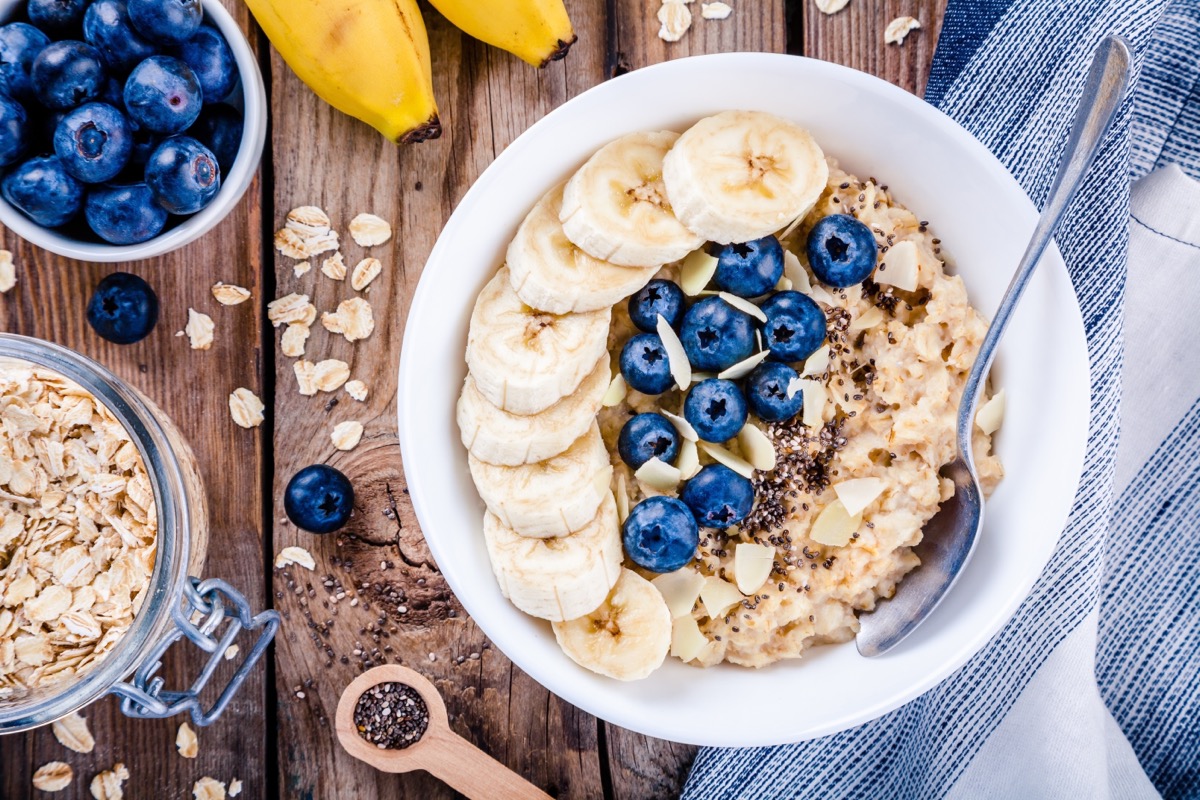
Unlike protein, carbohydrates, and fats, fiber cannot be digested by the body. However, it can still have a major impact on your digestive tract—especially if you suffer from IBS.
"It is widely believed that IBS is caused by a deficient intake of dietary fiber, and most physicians recommend that patients with IBS increase their intake of dietary fiber in order to relieve their symptoms," explains a 2017 study published in the International Journal of Molecular Medicine.
However, those researchers note that because different types of dietary fiber exhibit different physical and chemical properties, they affect IBS differently.
"Short-chain soluble and highly fermentable dietary fiber, such as oligosaccharides results in rapid gas production that can cause abdominal pain or discomfort, abdominal bloating or distension, and flatulence in patients with IBS. By contrast, long-chain, intermediate viscous, soluble and moderately fermentable dietary fiber, such as psyllium results in a low gas production and the absence of the symptoms related to excessive gas production," the study states.
Raj Dasgupta, MD, chief medical advisor for Fortune Recommends Health, says that opting for soluble fiber sources, such as oatmeal, can help improve your IBS symptoms. He notes that they "absorb water in your gut, making your stools softer and easier to pass. They also can help regulate your bowel movements without causing a lot of extra gas or bloating."
2
Probiotics
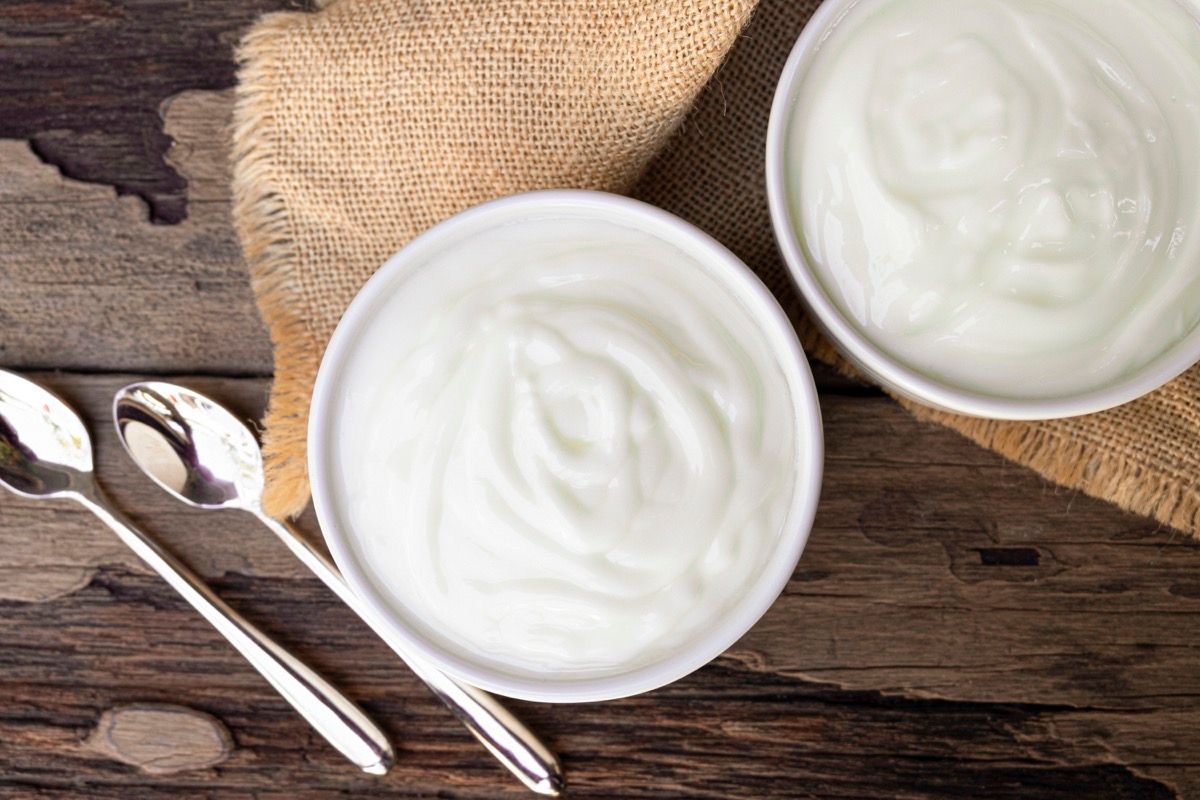
According to the Mayo Clinic, changes in gut microbes can impact the severity of one's IBS symptoms. "Examples include changes in bacteria, fungi and viruses, which typically reside in the intestines and play a key role in health. Research indicates that the microbes in people with IBS might differ from those in people who don't have IBS," they note.
To that end, Dasgupta recommends regularly eating probiotic foods, which can help restore the gut microbiota. "Yogurt with live cultures, kefir, kimchi, and sauerkraut contain helpful bacteria that can help improve your gut health," the doctor explains. "These probiotics help restore balance in your digestive system, helping eliminate symptoms like gas, bloating, and irregular bowel movements."
RELATED: What Happens to Your Body When You Drink Coffee on an Empty Stomach.
3
Ginger
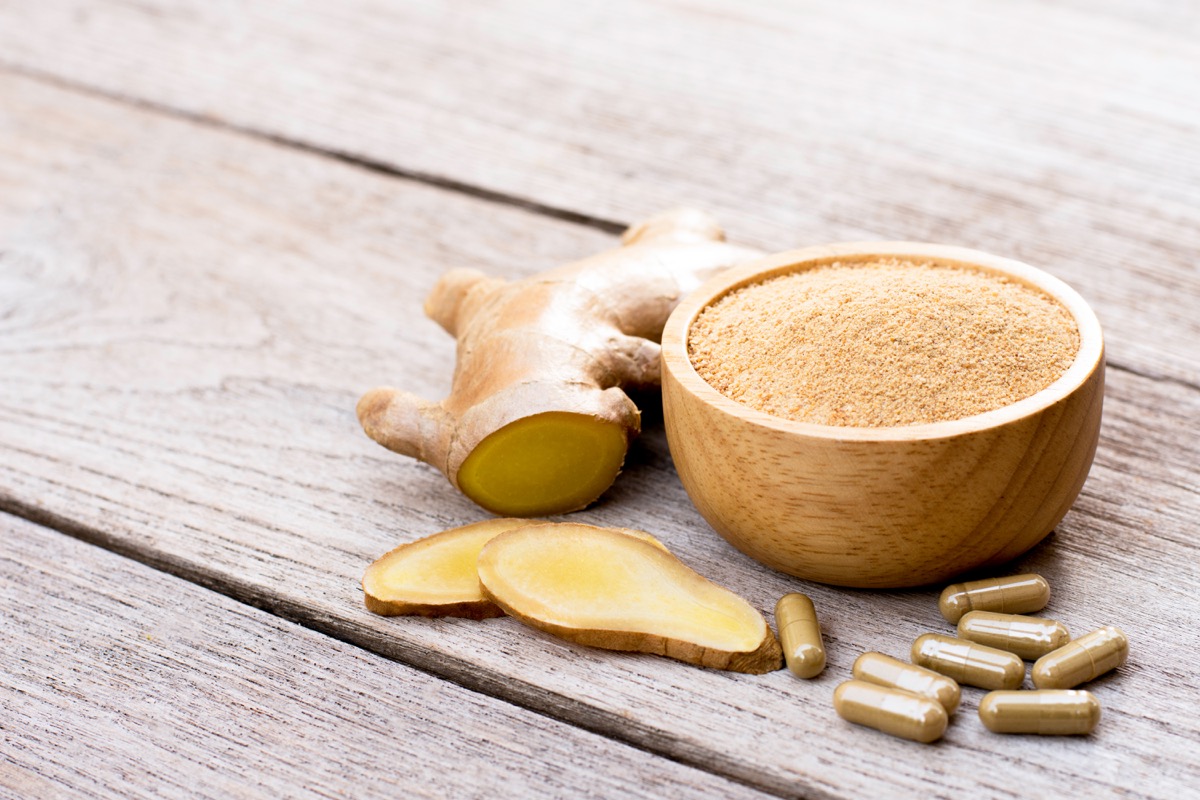
According to a 2018 study published in the Journal of Inflammation Research, "chronic, low-grade, subclinical inflammation has been implicated in the disease process and is thought to perpetuate the symptoms of IBS."
That's why Dasgupta recommends eating foods that naturally fight inflammation. "Ginger is naturally anti-inflammatory and can soothe the digestive system, helping with symptoms like nausea, bloating, and cramping. Whether it's consumed fresh, as a tea, or in supplement form, ginger can help ease any gastrointestinal discomfort," he tells Best Life.
4
Herbal teas
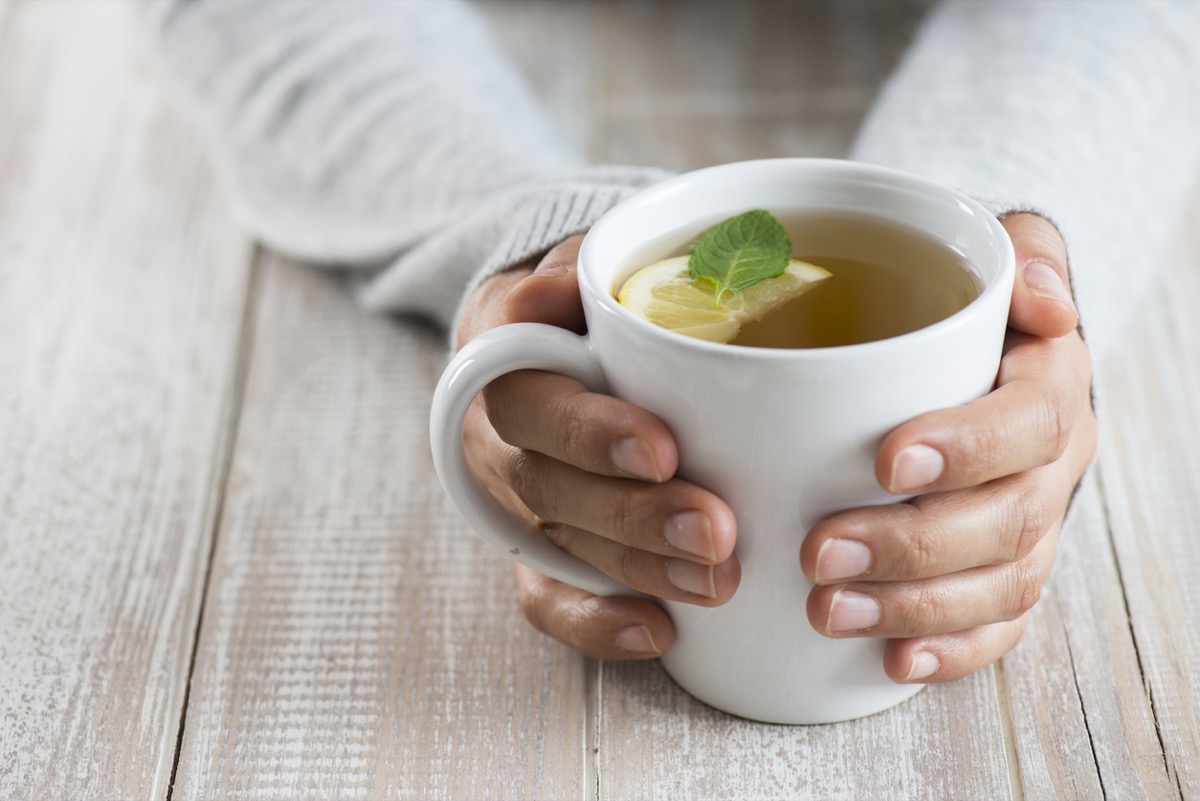
Similarly, certain herbal teas can also help to soothe your IBS symptoms. "Chamomile, fennel, and lemon balm teas can help lessen gastrointestinal discomfort. Chamomile, in particular, is anti-inflammatory, while fennel can help with gas and bloating," says Dasgupta.
Peppermint teas may be especially beneficial, the doctor notes. "Peppermint has menthol, a natural muscle relaxant. Peppermint tea or supplement capsules can help relax the muscles in your digestive tract, reducing spasms or discomfort that are associated with IBS," he says.
RELATED: What Really Happens to Your Body If You Don't Go to the Bathroom Every Day.
5
Low-fructose and low-sorbitol fruits and veggies
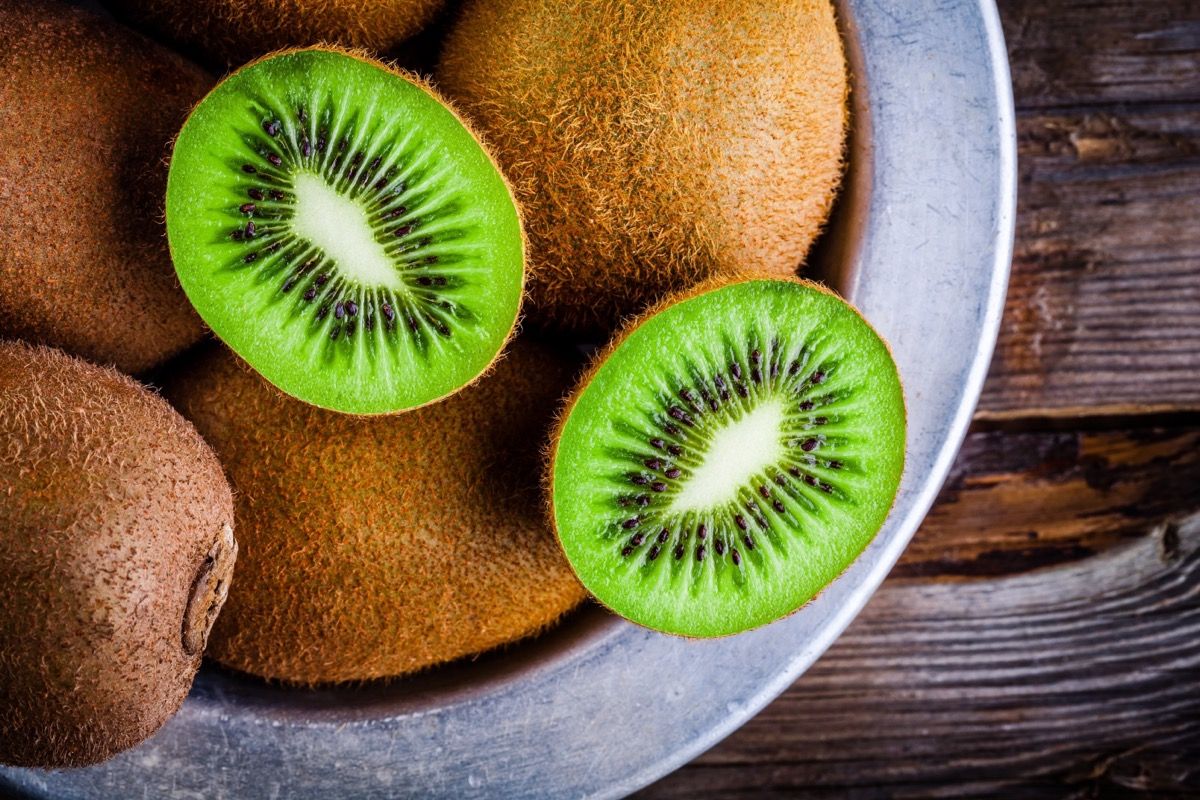
Many doctors theorize that IBS occurs when a person's intestines lack the enzymes they need to digest sugar. That's why choosing the right fruits and veggies—those that are lower in fructose and sorbitol—can also impact your IBS symptoms, says Kylie Bensley, MS, RD, a certified nutritionist, clinical dietician and founder of Sulinu.
She recommends eating low-fructose fruits such as kiwi fruits, strawberries, green bananas, blueberries, pomegranates, and raspberries. "It's best to eat vegetables that are lower in sorbitol, such as green beans, carrots, and eggplant," the dietitian advises.
6
Lean protein
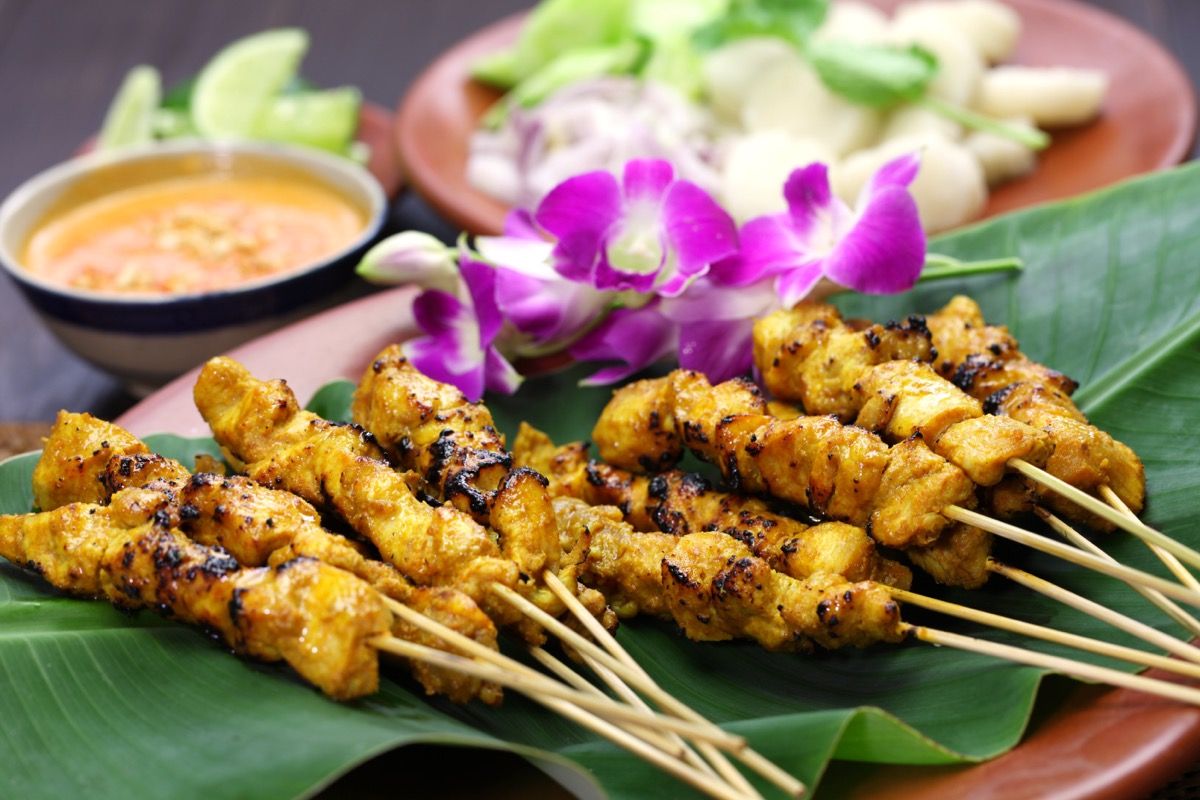
Rich, fatty, or processed cuts of meat can easily aggravate your IBS symptoms, so leaner sources of protein are considered preferable. "They give you essential amino acids without overloading your digestive system, making them ideal for managing IBS symptoms," says Dasgupta.
"Eggs are easy to digest and don't upset the colon," agrees Pall. "Lean meats are another great source of protein and give you a lot of food options for meal planning. Lean meats include lean cuts of beef (e.g., sirloin, top/bottom round steaks), pork, white meat chicken, and white meat turkey."
"Doctors often advise patients to eat animal protein such as grass-fed beef or free-range poultry as this decreases the potential for inflammation of the digestive tract that other cuts of meat may cause," Pall adds.
Finally, Pall notes that salmon and other fish high in omega-3s are typically beneficial for those with IBS: "This also includes herring, black cod, anchovies, whitefish, sardines, rainbow trout, and mackerel."
RELATED: The Only Foods You Should Be Eating at Night, Doctor Says.
7
Quinoa
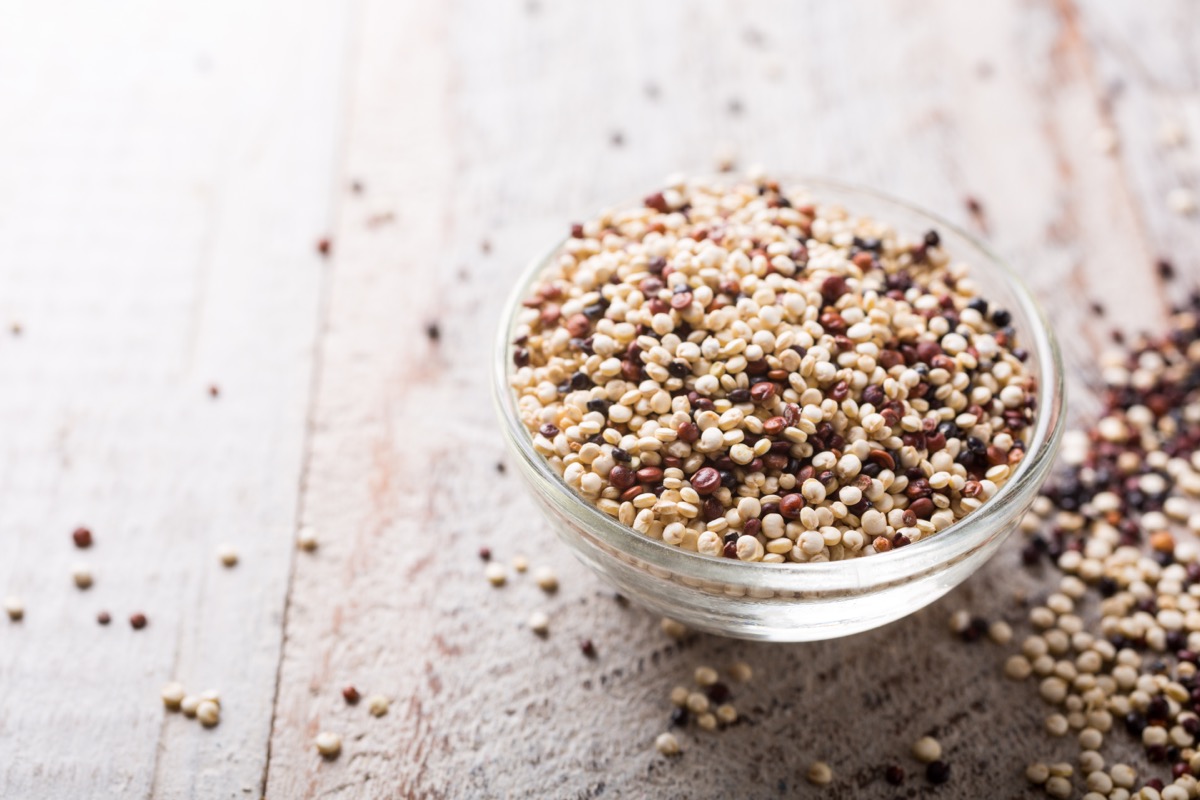
Whole grains, being high in insoluble fiber, are notorious for prompting IBS symptoms. Rye and barley can similarly cause a spike in discomfort. However, experts say that quinoa can offer a safer alternative for many people suffering from gastrointestinal conditions.
"Quinoa is a gluten-free whole grain that's rich in protein and fiber. Unlike some other grains, quinoa is easy to digest and less likely to cause GI irritation, making it a good choice for people with IBS," says Dasgupta.
8
Bone broth
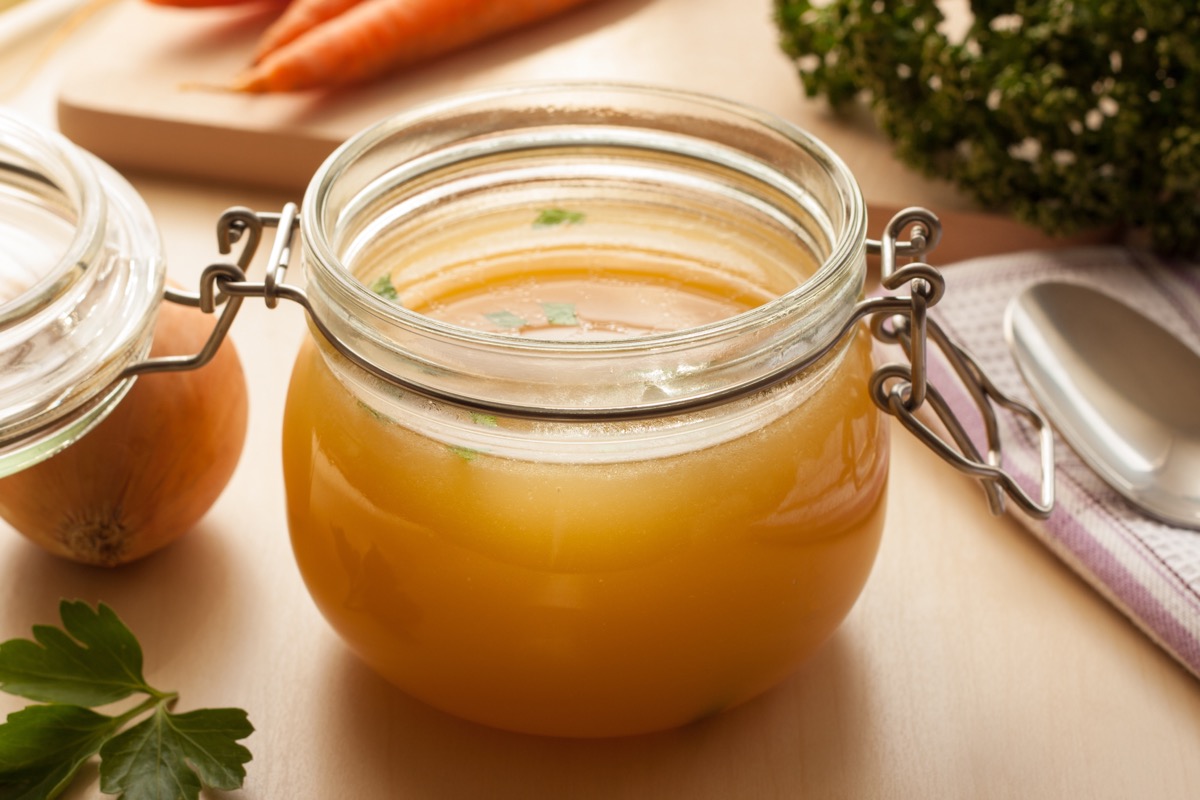
Finally, some experts say that you can soothe the gut by adding bone broth to your routine.
"Bone broth is made by simmering bones and connective tissue in water, extracting nutrients like collagen, gelatin, and amino acids. It's gentle on the digestive system and can help soothe inflammation in the gut, making it easier to digest other foods," explains Dasgupta.
Best Life offers the most up-to-date information from top experts, new research, and health agencies, but our content is not meant to be a substitute for professional guidance. When it comes to the medication you're taking or any other health questions you have, always consult your healthcare provider directly.





















